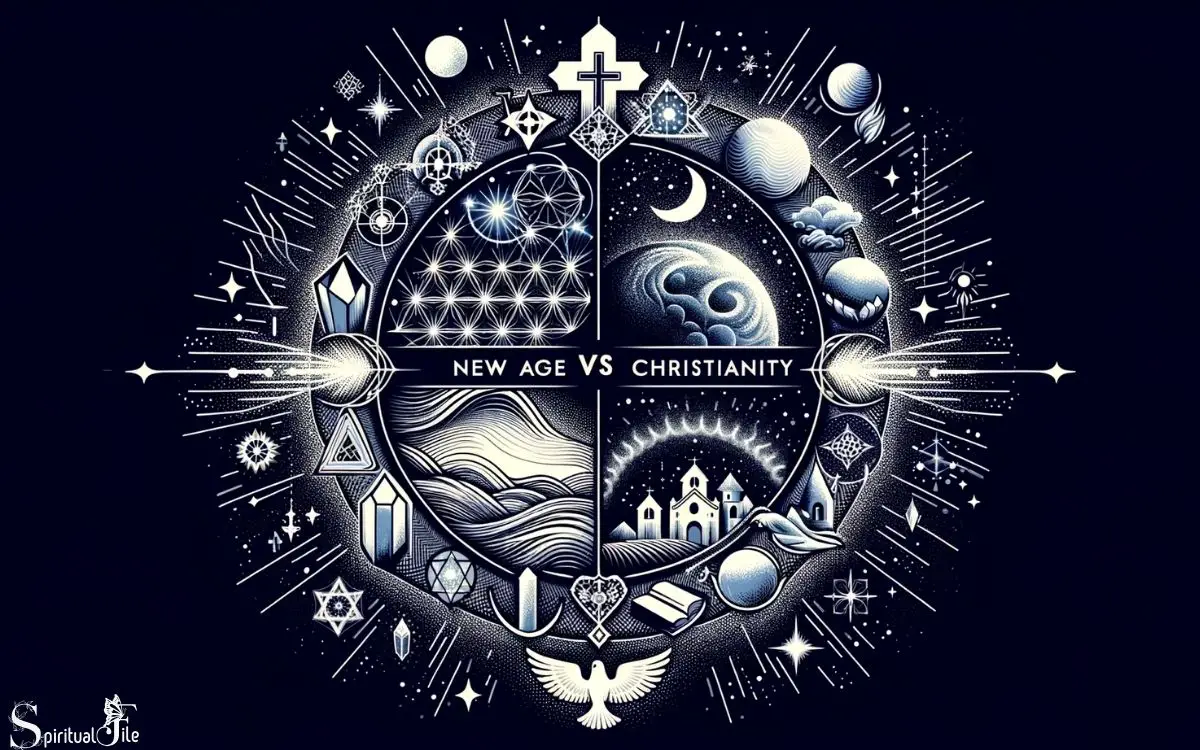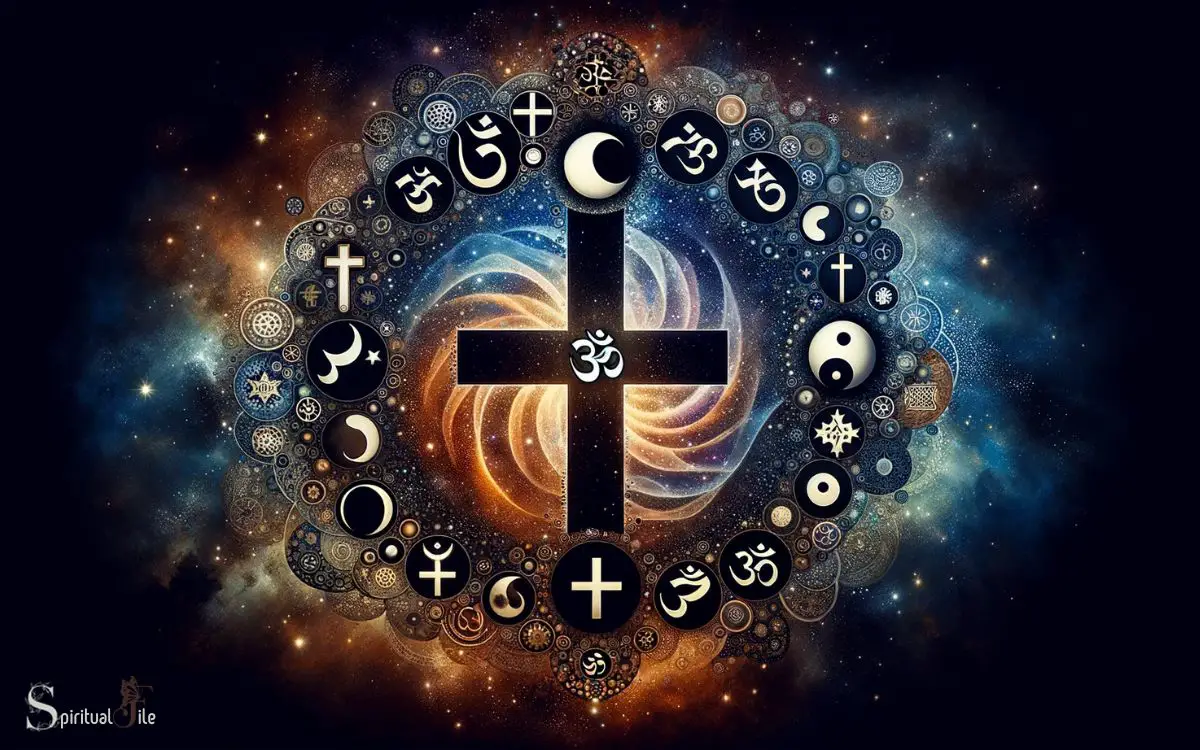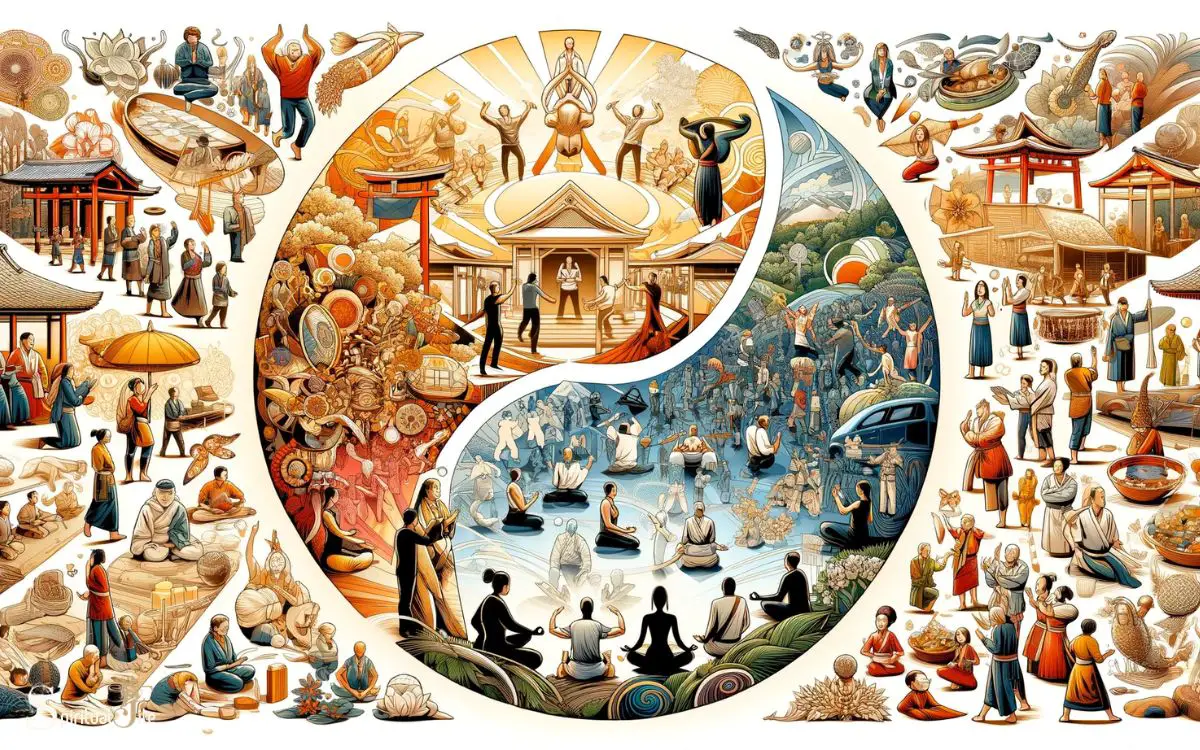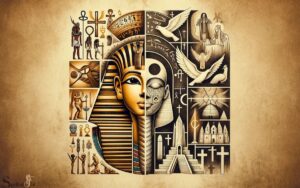New Age Spirituality Vs Christianity: Divinity!
New Age spirituality and Christianity represent two distinct belief systems with different approaches to spirituality, divinity, and practices.
New Age spirituality emphasizes personal spiritual experience, cosmic energies, and the interconnectedness of all things, often drawing from various religious traditions and emphasizing personal growth and self-actualization.
Christianity, on the other hand, is a monotheistic religion centered on the life, teachings, and resurrection of Jesus Christ, relying on the Holy Bible as its sacred text and guiding followers through established doctrines and church communities.
New Age Spirituality:
Focuses on a holistic approach to spirituality, including meditation, astrology, and a belief in a higher self. Draws from multiple traditions and philosophies, often mixing various elements. Emphasizes self-discovery, healing, and a connection to the universe.
Christianity:
Centers on the belief in one God and Jesus Christ as the Son of God and Savior. Follows the teachings and scriptures of the Holy Bible. Practices include prayer, worship services, and sacraments such as baptism and communion.
For example, a New Age practitioner might use crystals for healing and believe in reincarnation, while a Christian would pray for healing and believe in an afterlife in heaven or hell based on their faith in Jesus Christ.

Key Takeaway
7 Aspects: New Age Spirituality Vs Christianity
| Aspect | New Age Spirituality | Christianity |
|---|---|---|
| Beliefs | Eclectic, diverse, and inclusive | Monotheistic, faith in Jesus |
| Deity/Dieties | Varied, often non-traditional | God, Jesus Christ, Holy Trinity |
| Afterlife | Reincarnation, karma, diverse | Heaven, Hell, salvation by faith |
| Scripture | No central text, diverse sources | Bible (Old and New Testaments) |
| Practices | Meditation, energy healing | Prayer, sacraments, worship |
| Religious Authority | Personal experience and intuition | Church hierarchy, clergy |
| Conversion | Open to exploration and choice | Active proselytizing |
Origin and Historical Background

The origin and historical background of New Age spirituality and Christianity can be traced back to distinct cultural and religious movements that emerged in different historical periods.
Christianity, with its roots in Judaism, emerged in the 1st century in the Middle East, spreading through the Roman Empire and beyond. It is centered around the life, teachings, death, and resurrection of Jesus Christ.
In contrast, New Age spirituality is a diverse movement that gained prominence in the 1970s and incorporates elements of Eastern and Western spiritual traditions, esotericism, and alternative healing practices.
It emphasizes personal spiritual growth and the interconnectedness of all beings. Understanding the historical contexts from which these belief systems emerged is crucial in comprehending their fundamental principles and how they have evolved over time.
Beliefs About the Nature of God

In comparison to Christianity, New Age spirituality incorporates a diverse range of beliefs about the nature of God, drawing from various spiritual traditions and emphasizing personal interpretation and experience.
New Age adherents often view God as an immanent and transcendent force present in all living beings and the natural world. This concept differs from the Christian view of a personal, omnipotent, and omniscient God, distinct from creation.
Moreover, New Age beliefs about the nature of God often include ideas such as pantheism, the belief that the divine is present in everything, and the interconnectedness of all living beings.
These perspectives contrast with the traditional Christian understanding of God as a separate entity from creation, involved in human affairs and providing salvation through Jesus Christ.
Views on the Afterlife and Salvation

Drawing from various spiritual traditions, New Age spirituality incorporates a diverse range of beliefs about the afterlife and salvation, reflecting its emphasis on personal interpretation and experience.
- Reincarnation: Many New Agers believe in the concept of reincarnation, where the soul undergoes multiple lifetimes to learn and evolve spiritually.
- Universalism: Some adherents hold the belief in universal salvation, suggesting that all individuals will eventually be reconciled with the divine, regardless of their actions in life.
- Self-realization: Another perspective is that salvation is achieved through self-realization and enlightenment, emphasizing the individual’s inner journey towards spiritual awakening and unity with the divine.
These varied beliefs reflect the flexibility and individualized nature of New Age spirituality, contrasting with the more structured views on the afterlife and salvation found in traditional Christian teachings.
The Role of Humanity and Purpose

Reflecting diverse perspectives on the purpose and role of humanity, New Age spirituality and Christianity offer distinct outlooks on the nature of human existence.
| Aspect | New Age Spirituality | Christianity |
|---|---|---|
| Purpose | To achieve personal enlightenment and oneness | To glorify God and serve His will |
| Role | Co-creators with the universe | Stewards of God’s creation and servants of His will |
| Destiny | Self-realization and spiritual evolution | Eternal life in communion with God |
| Contribution to world | Spreading love and positive energy | Spreading the gospel and serving others |
New Age spirituality emphasizes personal spiritual growth and interconnectedness with the universe, while Christianity focuses on serving God and others, with the hope of eternal life. These differing perspectives greatly influence beliefs about the purpose and role of humanity.
Moving from these perspectives, it is important to consider the practices and rituals associated with these belief systems.
Practices and Rituals

When examining the differences between New Age spirituality and Christianity, it is crucial to explore the practices and rituals that define these belief systems.
Symbolism and meaning, ceremony and significance, as well as the balance between tradition and modernity are key aspects to consider in this comparison.
Understanding how these practices and rituals shape the spiritual experiences and beliefs of individuals within each tradition is essential for a comprehensive analysis.
Symbolism and Meaning
Symbolism plays a significant role in both New Age spirituality and Christianity, influencing their respective practices and rituals. In New Age spirituality, symbolism often focuses on interconnectedness, the power of nature, and the search for inner peace.
Meanwhile, Christianity employs symbolism to represent divine truths, salvation, and the presence of God in everyday life.
- Interconnectedness: Symbols are used to convey the idea of the interconnectedness of all living beings and the universe.
- Divine Truths: Symbolism is utilized to represent essential Christian beliefs, such as the cross symbolizing Jesus Christ’s sacrifice.
- Nature and God’s Presence: Both traditions use symbols to signify the presence of the divine in the natural world and in human experiences.
Understanding the symbolism in these practices and rituals provides insight into the deeper meanings and significance they hold. This understanding is essential to appreciating the ceremonies and rituals within each tradition.
Ceremony and Significance
In both New Age spirituality and Christianity, ceremony and significance in practices and rituals are expressed through intricate symbolism and deliberate actions.
This is evident in the way both belief systems utilize rituals to convey deeper spiritual meanings and create a sense of connection with the divine.
New Age spirituality often incorporates ceremonies such as meditation circles, crystal rituals, and energy healing sessions, all aimed at achieving spiritual growth and healing.
These practices are seen as transformative and provide individuals with a means to connect with higher consciousness or universal energy. The use of crystals, for example, is believed to harness the energy of the earth and promote balance and healing.
Similarly, Christianity emphasizes the significance of sacraments like baptism, communion, and the observance of religious holidays, all rich in symbolic meaning and spiritual significance.
Baptism, for example, is seen as a ritual of initiation into the Christian faith, symbolizing purification and rebirth.
Communion, on the other hand, represents the sharing of the body and blood of Christ and is considered a sacred act of remembrance and unity.
These practices serve to deepen the understanding and connection to the divine, fostering a sense of community and shared spirituality. They provide individuals with a sense of belonging and allow them to participate in a larger spiritual tradition.
Understanding the symbolism and significance in these rituals is essential to grasping the core of each belief system. It allows individuals to engage more fully in their spiritual practices and deepen their relationship with the divine.
Transitioning to the subsequent section about ‘tradition and modernity’, it is imperative to explore how these ancient practices interact with contemporary society.
Tradition and Modernity
Having established the intricate symbolism and significance of practices and rituals in both New Age spirituality and Christianity, the interaction of these ancient traditions with contemporary society is a crucial aspect to consider.
When examining the intersection of tradition and modernity in spiritual practices, it is important to recognize that:
- Adaptation: Both New Age spirituality and Christianity have adapted their traditional practices to resonate with modern lifestyles.
- Innovation: Modern technology and communication have been leveraged to spread and enhance traditional practices and rituals.
- Challenges: The clash between traditional beliefs and modern values poses challenges in maintaining the authenticity and relevance of practices.
The fusion of tradition and modernity in spiritual practices reflects the dynamic nature of human spirituality. Such a dynamic could influence the ethical and moral considerations within these belief systems.
Morality and Ethics

The comparison of morality and ethics between New Age spirituality and Christianity offers valuable insights into the foundational values of these belief systems.
Understanding the ethical teachings and moral principles of each belief system allows for a deeper exploration of their differences and similarities.
Values in Belief Systems
Exploring the moral and ethical foundations of belief systems reveals the fundamental principles that guide adherents’ conduct and decision-making. These values are deeply embedded in the fabric of each belief system, shaping the moral compass of its followers.
- Compassion: Many belief systems emphasize compassion as a core value, promoting kindness, empathy, and understanding towards others.
- Integrity: Integrity is often upheld as a crucial virtue, encouraging individuals to act in accordance with their moral principles and maintain honesty and righteousness in their actions.
- Respect for Life: A reverence for life in all its forms is a common value, fostering a deep respect for the sanctity of life and the interconnectedness of all living beings.
These values form the ethical foundation of belief systems and significantly influence the behavior and decision-making of their adherents.
Moving forward, it is important to compare and contrast the ethical teachings of these belief systems.
Ethical Teachings Compared
When comparing the ethical teachings of New Age spirituality and Christianity, it becomes evident that their perspectives on morality and ethics diverge significantly.
In Christianity, morality and ethics are often rooted in the belief in a transcendent, personal God who has established absolute moral standards.
This provides a framework for understanding right and wrong, with the Ten Commandments and the teachings of Jesus Christ serving as foundational guides for ethical behavior.
On the other hand, New Age spirituality tends to emphasize individual spiritual growth, self-discovery, and the interconnectedness of all beings. Morality and ethics are often seen as subjective and evolving, shaped by personal intuition and the universal law of karma.
While both belief systems aim to promote virtuous living, their approaches to moral and ethical decision-making fundamentally differ.
Community and Fellowship

Christianity’s emphasis on community and fellowship is deeply rooted in its teachings and practices. The concept of community and fellowship in Christianity is central to the faith and is manifested through various practices and beliefs,
including:
- Church as a community: The church is not just a place of worship, but a community of believers who support and uplift each other.
- Fellowship gatherings: Regular gatherings for prayer, worship, and mutual support strengthen the bond within the Christian community.
- Serving others: Christians are encouraged to serve and love one another, fostering a sense of fellowship and community.
These practices create a strong sense of belonging and support among believers, shaping their worldview and interactions with others.
This emphasis on community has a profound impact on modern society, influencing social interactions and support systems.
Impact on Modern Society

The emphasis on community and fellowship in Christianity has had a significant impact on modern society, shaping social interactions and support systems.
Christian values such as compassion, empathy, and service have influenced various social welfare initiatives, leading to the establishment of numerous charitable organizations and outreach programs.
The concept of loving thy neighbor and caring for the less fortunate has permeated societal norms, contributing to a culture of altruism and philanthropy.
Moreover, the idea of forgiveness and reconciliation, central to Christian teachings, has influenced conflict resolution strategies and restorative justice practices in contemporary society.
In essence, the principles and practices derived from Christianity continue to play a pivotal role in fostering a more compassionate, supportive, and cohesive modern society.
How Does Christianity Differ from New Age Spirituality in Regards to Divinity and True Spirituality?
Christianity and new age spirituality have differing perspectives on divinity and true spirituality. In Christianity, divinity is personified in the Holy Trinity of Father, Son, and Holy Spirit, while true spirituality is found in following Christ’s teachings. In contrast, new age spirituality vs true spirituality focuses on individual enlightenment and connection to the universe.
Frequently Asked Questions
How Do New Age Beliefs About the Nature of God Differ From Traditional Christian Beliefs?
New Age beliefs about the nature of God often emphasize a cosmic consciousness or divine energy present in all things, transcendent deity who is the creator and ruler of the universe.
What Specific Practices and Rituals Are Commonly Associated With New Age Spirituality That Are Not Found in Christianity?
New Age spirituality commonly involves practices like meditation, crystal healing, and energy work, which are not found in traditional Christianity.
These rituals are intended to promote self-discovery, healing, and spiritual growth, reflecting a different approach to spirituality.
How Does the New Age View of the Afterlife and Salvation Differ From the Christian Perspective?
In the perspective of New Age spirituality, the afterlife is often viewed as a continuation of spiritual growth and learning, while salvation is seen as a personal journey towards self-realization and enlightenment.
This differs from the Christian belief in salvation through faith in Jesus Christ for eternal life.
What Impact Has New Age Spirituality Had on Modern Society, and How Does It Compare to the Impact of Christianity?
New Age spirituality has influenced modern society through its emphasis on personal growth, holistic healing, and environmental consciousness.
Its impact, though significant, differs from that of Christianity, which has historically shaped societal structures and cultural norms.
What Are the Main Differences in the Moral and Ethical Teachings Between New Age Spirituality and Christianity?
The main differences in moral and ethical teachings between New Age spirituality and Christianity lie in their perspectives on sin, redemption, and the afterlife.
New Age spirituality emphasizes self-discovery and personal growth, while Christianity focuses on repentance and salvation through faith in Jesus Christ.
Conclusion
The clash between new age spirituality and Christianity represents a battle of the hearts and minds. Like two rivers converging, each belief system flows with its own unique force, shaping the landscape of human understanding.
As we navigate the currents of faith and spirituality, may we find the wisdom to bridge the divide and embrace the unity of our shared human experience. Let us seek the common ground where the waters of belief converge, and find peace in our diversity.






